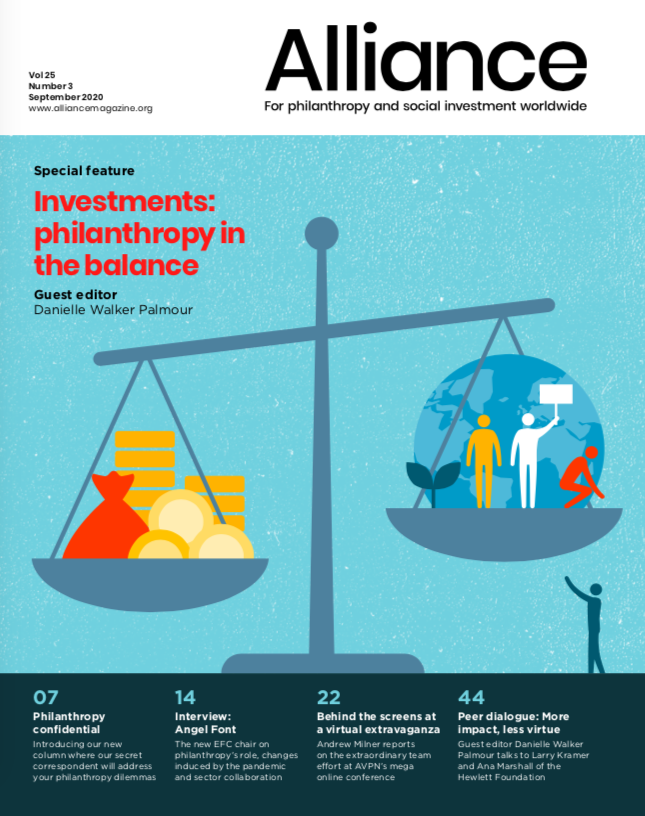Foundations could take the lead in making mission-driven investing a mainstream practice. The pandemic may give them a push in that direction
For reasons that are both systemic and paradigmatic, mission-driven investing in South Africa is in its infancy with little evidence of the practice across the $3 billion of local foundations’ assets under management. Foundation decision-makers are influenced by an investment value chain only recently warming to the purpose and practice of impact investing. Similarly, trustees are just starting to shake off traditional approaches to the allocation of their assets.
However, the Covid-19 crisis has motivated South African foundations to respond with urgent adaptation. Mandates have been revised to support initiatives set up by government and civil society, largely reinforcing the work of their existing grantees delivering services to those in need. The challenge foundations face is whether they have the choice to ignore new approaches to the way they invest their assets to meet their current commitments, rebuild their balance sheets and fund the future of their mission.
The current state of mission-driven investing
Anthony Farr, CEO of the Allan Gray Orbis Foundation Endowment, a foundation investing in a series of innovative partners and programmes addressing poverty and employment through entrepreneurship, observes ‘a move towards greater interest… assisted by the local offices of international foundations’ but notes that ‘unfortunately, most foundations are still looking at the 4-5 per cent of asset annual spend as the driver or their impact rather than aligning 100 per cent of their assets with their mission’.
Since the outbreak, South African foundations have demonstrated an inspiring capacity to revise their processes and criteria to meet emergency needs.
There are a series of reasons for the lack of progress, documented by a recent study of South African foundation leaders’ attitudes to the topic: investment advisers have not proposed these strategies for foundations; there are concerns over the financial portfolio performance of impact investing; they lack conviction that the existing investment strategy provides the funds to execute the foundation’s mission; and finally, foundations’ lack of internal skill or capacity to implement impact investment strategies.
Johann Snyman, principal at sustainability investor, SAAD Investments, confirms that the notion of mission-investing has only recently surfaced in South Africa. He suggests that growing maturity around impact measurement and metrics will aid adoption as investment professionals become ‘better placed to report back to their clients on more easily verifiable and objective impact-related results’.
The unforeseen impact of Covid-19 could well provide a further catalyst for change in thinking and practice. Since the outbreak, South African foundations have demonstrated an inspiring capacity to revise their processes and criteria to meet emergency needs, distributing substantially more in grants, highlighted by Louise Driver, executive director of IPASA, an association of private and corporate foundations operating in the country. Innovative initiatives include collaborative funding mechanisms such as Mergon Foundation’s GAP Fund.
With the agency they possess as owners of significant pools of assets, and active participants in the investment process, foundations have the power to lead their peers, partners and service providers.
Foundations in South Africa have been integral to funding research, collaboration and innovation in the social sector for generations, largely through donations and grants. These philanthropic investments alleviate a number of the prevailing ills of South African society. With their track record for managing social impact, there is a latent opportunity to redirect the skills and experience of foundations towards investments aligned with their mission that offer financial returns too.
With the agency they possess as owners of significant pools of assets, and active participants in the investment process, foundations have the power to lead their peers, partners and service providers. By influencing the investment value chain and shifting the attitudes (and perhaps the tenure) of trustees, foundations are poised to advance the progress of impact investing as a whole. It’s time to take that lead.
Colin Habberton is co-founder of the Relativ Group.
Email: colin@relativimpact.com
Twitter: @relatomics






Comments (0)